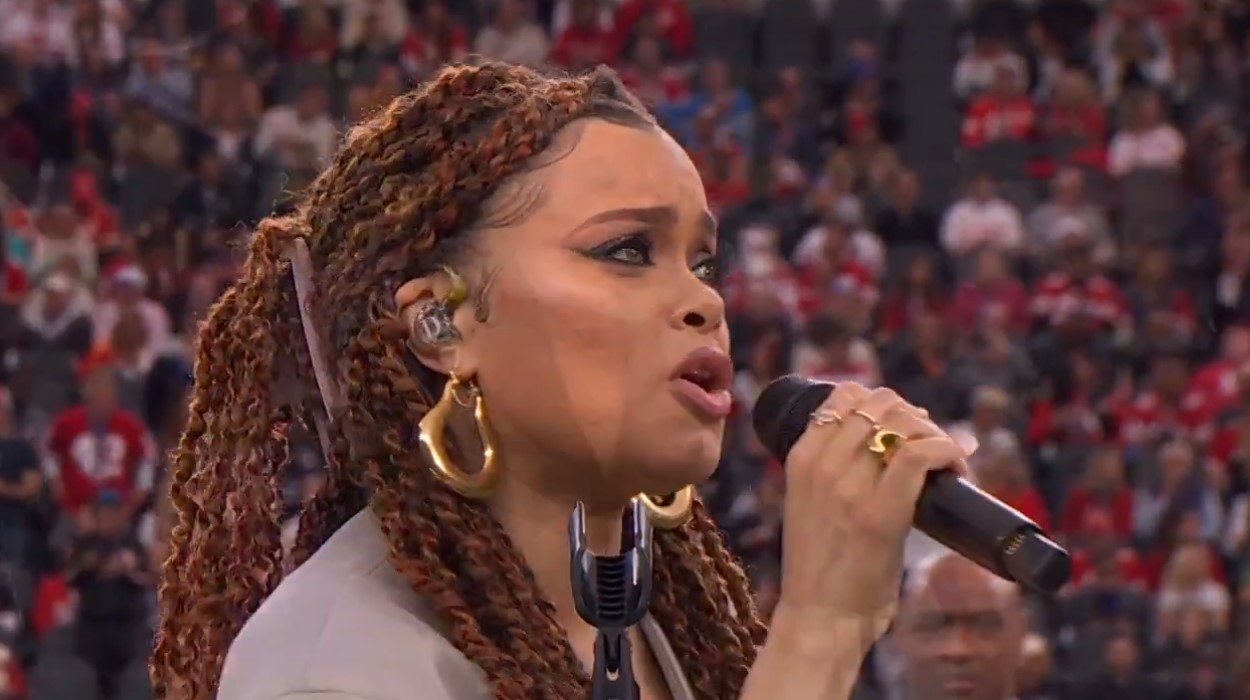Black National Anthem Super Bowl: A Celebration Of Culture And Unity
When the Black National Anthem Super Bowl performance took center stage, it wasn’t just music—it was a powerful moment of cultural significance. The rendition of "Lift Every Voice and Sing" during one of the biggest sporting events in the world brought an emotional resonance that struck a chord with millions of viewers. This performance wasn’t just about entertainment; it was a statement, a celebration, and a reminder of the rich history and resilience of Black Americans.
The Super Bowl isn’t just about football anymore. It’s become a platform for artists to showcase their talents and, more importantly, to deliver messages that resonate with people worldwide. This year’s inclusion of the Black National Anthem was a game-changer, and it sparked conversations about representation, identity, and the importance of honoring diverse voices in mainstream media.
As we dive into the details of this monumental event, you’ll discover why the Black National Anthem Super Bowl moment was so impactful. From its historical roots to the modern-day significance, this article will explore everything you need to know about this unforgettable performance.
Read also:Plan B Costco Your Ultimate Guide To Emergency Essentials
What is the Black National Anthem?
The term "Black National Anthem" refers to "Lift Every Voice and Sing," a song that has deep historical and cultural significance for African Americans. Written by James Weldon Johnson and his brother John Rosamond Johnson in 1900, the song has been embraced as an anthem of hope, resilience, and pride. It’s often sung during important events, ceremonies, and gatherings within the Black community.
Now, you might be wondering, why is this song so special? Well, it’s not just any song—it’s a reflection of the struggles and triumphs of Black Americans throughout history. The lyrics speak to the fight for freedom, equality, and justice, making it a powerful symbol of unity and strength.
For many, the inclusion of the Black National Anthem at the Super Bowl was a long-overdue recognition of its importance. It marked a moment where mainstream America acknowledged the cultural significance of this song and its role in shaping the nation’s identity.
Why Was the Black National Anthem Performed at the Super Bowl?
The decision to include the Black National Anthem Super Bowl performance was a deliberate effort to amplify Black voices and celebrate diversity. In recent years, there’s been a growing movement to address systemic inequalities and promote inclusivity in all areas of society, including sports and entertainment.
The Super Bowl, being one of the most-watched events globally, provided the perfect platform to bring attention to this important issue. By featuring the anthem, the NFL aimed to honor the contributions of Black athletes, artists, and communities while fostering a sense of unity among all viewers.
Let’s break it down: The Super Bowl isn’t just about touchdowns and halftime shows anymore. It’s about creating meaningful experiences that resonate with audiences on a deeper level. The inclusion of the Black National Anthem was a step in the right direction, and it set the tone for future events to follow suit.
Read also:Why Charles Amp Keith Has Become Every Fashionistas Goto Brand
Historical Context of the Black National Anthem
To truly understand the significance of the Black National Anthem Super Bowl moment, we need to look at its historical roots. "Lift Every Voice and Sing" was first performed in 1900 at a school in Jacksonville, Florida, to honor Abraham Lincoln’s birthday. Since then, it has evolved into a symbol of Black pride and resistance.
Throughout the years, the song has been sung during pivotal moments in history, such as the Civil Rights Movement and various protests for racial justice. Its lyrics serve as a reminder of the ongoing struggle for equality and the unyielding spirit of the Black community.
So, when you hear the Black National Anthem being performed at the Super Bowl, remember that it’s not just a song—it’s a testament to the strength and resilience of an entire community.
Who Performed the Black National Anthem at the Super Bowl?
The Black National Anthem Super Bowl performance was delivered by none other than Alicia Keys, the legendary singer-songwriter and activist. Known for her powerful voice and heartfelt performances, Keys brought the song to life with her signature style and emotion.
Here’s a quick bio of Alicia Keys:
| Full Name | Alicia Augello Cook |
|---|---|
| Birthdate | January 25, 1981 |
| Place of Birth | Manhattan, New York, USA |
| Occupation | Singer, Songwriter, Pianist, Activist |
| Genre | R&B, Soul, Pop |
Alicia Keys is more than just a musician—she’s a voice for change. Her involvement in social justice movements and her commitment to promoting equality make her the perfect choice to perform the Black National Anthem at such a high-profile event.
Why Alicia Keys?
Alicia Keys was chosen for the Black National Anthem Super Bowl performance because of her ability to connect with audiences on an emotional level. Her music has always been about empowerment and unity, making her the ideal artist to bring this message to the forefront.
Plus, let’s be real—her voice is absolutely incredible. There’s no one better suited to deliver the soulful and powerful rendition that the anthem deserves.
Impact of the Black National Anthem Super Bowl Performance
The impact of the Black National Anthem Super Bowl moment was felt far beyond the stadium. Social media exploded with reactions, and the performance sparked conversations about representation and inclusion in mainstream media.
Many viewers expressed their gratitude for the inclusion of the anthem, while others took the opportunity to educate themselves about its history and significance. It was a moment that brought people together, regardless of their backgrounds or beliefs.
Here are some of the key takeaways from the performance:
- It highlighted the importance of recognizing and celebrating diverse voices.
- It provided a platform for discussions about racial justice and equality.
- It demonstrated the power of music to unite people and create meaningful change.
Viewer Reactions
Reactions to the Black National Anthem Super Bowl performance were overwhelmingly positive. Fans praised Alicia Keys for her powerful rendition and the NFL for its decision to include the anthem in the pre-game ceremony.
Some viewers even shared personal stories about how the song resonated with them, highlighting its ability to evoke emotions and inspire hope. It was a moment that truly brought people together, and it showed the potential for sports and entertainment to drive meaningful conversations.
The Role of Sports in Promoting Social Justice
Sports have long been a platform for promoting social justice, and the inclusion of the Black National Anthem Super Bowl is just one example of how this can be done effectively. Athletes and organizations have a unique ability to reach large audiences and influence public opinion, making them powerful allies in the fight for equality.
From Colin Kaepernick’s national anthem protests to the activism of LeBron James and other prominent athletes, sports have played a crucial role in bringing attention to important social issues. The NFL’s decision to feature the Black National Anthem at the Super Bowl is a continuation of this tradition, and it sets a positive example for other leagues and organizations to follow.
How Sports Can Drive Change
Sports have the power to transcend barriers and bring people together. By using their platforms to promote social justice, athletes and organizations can inspire change and create a more inclusive society.
Here are some ways sports can drive change:
- By providing a platform for marginalized voices to be heard.
- By fostering conversations about important social issues.
- By setting an example for others to follow in terms of inclusivity and equality.
Why the Black National Anthem Matters Today
In a world where racial tensions continue to simmer, the Black National Anthem Super Bowl moment serves as a reminder of the progress that has been made and the work that still needs to be done. It’s a symbol of hope and resilience, and it encourages people to come together to create a more just and equitable society.
As we move forward, it’s important to recognize the significance of the Black National Anthem and its role in shaping the cultural landscape. By celebrating and honoring this song, we can continue to promote unity and understanding among all communities.
Looking to the Future
The future looks bright for the continued recognition and celebration of the Black National Anthem. As more organizations and institutions embrace diversity and inclusion, we can expect to see this song featured in even more high-profile events.
It’s not just about the anthem itself—it’s about the message it carries and the values it represents. By continuing to amplify Black voices and celebrate their contributions, we can create a world where everyone feels seen, heard, and valued.
Conclusion
The Black National Anthem Super Bowl performance was more than just a musical moment—it was a cultural milestone. It brought attention to the importance of recognizing and celebrating diverse voices, and it set the stage for future events to follow suit.
As we’ve explored in this article, the inclusion of the Black National Anthem at the Super Bowl was a powerful statement about the role of sports in promoting social justice. It highlighted the importance of representation, unity, and equality, and it provided a platform for discussions about these critical issues.
So, what can you do? Share this article with your friends and family, start conversations about the significance of the Black National Anthem, and continue to support efforts to promote diversity and inclusion in all areas of society. Together, we can create a world where everyone feels valued and respected.


